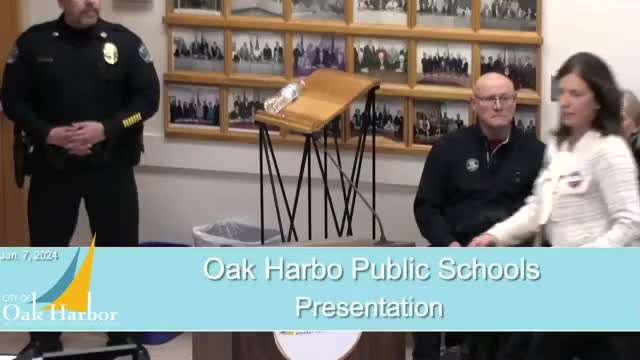Oak Harbor superintendent outlines levy replacement, says local funds pay for nurses, special education and deans of students
Get AI-powered insights, summaries, and transcripts
Subscribe
Summary
Oak Harbor Public Schools Superintendent Michelle Cascibula told the City Council on Jan. 7 that the district is asking voters to replace an expiring local levy to preserve services including special education, nurses, deans of students and school resource officers.
Oak Harbor Public Schools Superintendent Michelle Cascibula told the Oak Harbor City Council on Jan. 7 that the district is asking voters to replace an expiring local levy, which she said provides about 12% of the district’s operating budget and pays for services the state does not fully fund.
Cascibula told the council the state provides roughly 76% of the district’s budget, federal funding about 11%, and local levy revenue about 12%. She said the levy supports special education, full-time nurses in each building, deans of students, school resource officers and technology for student devices.
The levy is a replacement measure, not a new tax, Cascibula said. She explained how a levy is collected as a fixed rate approved by voters and does not automatically increase when home values rise. “Levy is locally controlled and approved by voters,” Cascibula said. “We can’t change how much we ask our local voters once that levy gets approved.”
Cascibula described Oak Harbor’s higher-than-average special-education population, attributing it in part to the partnership with Naval Air Station Whidbey Island and families who remain in town to access services. She emphasized the levy’s role in funding nurses, mental-health supports and deans of students — positions she said the state does not fully fund. “The state does not give us SRO funding,” she said, adding that the district and city share the cost of the school resource officer.
During the public-comment period, Jack Schwab, campaign manager for Citizens For Better Schools, urged the council to endorse and encourage a “yes” vote on the levy, saying local funds preserve programs from advanced placement classes to career and technical education and special education services. “Without these local levy funds, our local schools would be significantly diminished,” Schwab said.
In council comments at the end of the meeting Mayor Pro Tem Emero and Council member Psaki discussed whether the city should issue any formal endorsement or proclamation supporting the levy. Psaki said she prefers individual council members to speak personally rather than the city taking formal positions on levies and bonds. “I would like to see the city get away from endorsing bonds and levies for other organizations, if possible,” Psaki said.
The school district’s replacement levy will appear to voters on the ballot; Cascibula reminded listeners the measure requires a simple majority to pass, unlike a bond. She asked voters to evaluate the levy based on the district’s strategic plan priorities of academic excellence, safety, inclusion and community alignment.
The council did not take formal action on an endorsement during the Jan. 7 meeting; council members said they would discuss the possibility of an official proclamation at a future agenda or offline.
The district is identified on tax statements as School District 201; Cascibula noted the difference between locally controlled District 201 levy collections and state school taxes that the state sets and controls.
